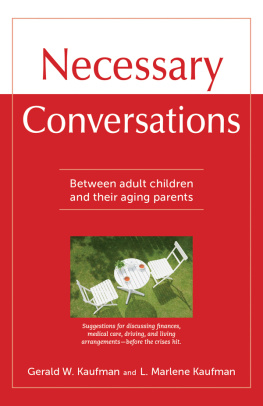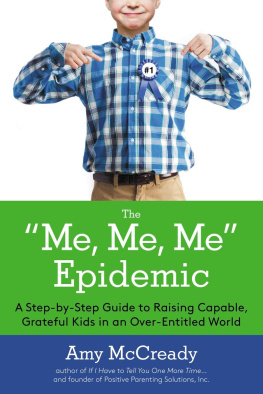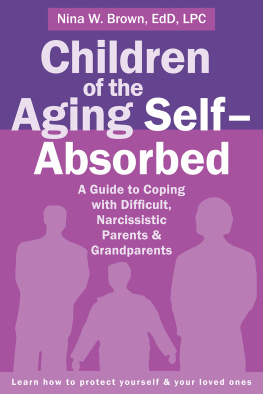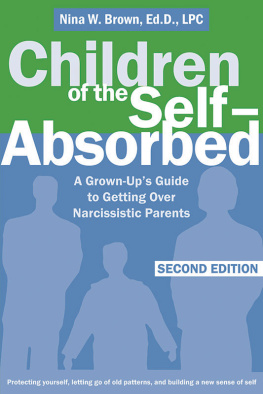Praise for
PARENTING YOUR EMERGING ADULT
There are numerous books to help parents through the sleepless nights and difficult days of infancy, the tumultuous terrible twos, the emotional roller coaster of puberty and the overall angst of adolescence. However, in my experience working with and studying parents, no period of their childrens development is as perplexing for parents as emerging adulthood and no task more difficult than helping their children successfully transition to adulthood. Despite the challenges in and the importance of emerging adulthood, for no period of development have fewer books been written to help parents. That has changed completely with this book!
Varda Konstam provides parents with an empirically based book that delivers an insightful, informative, and interesting look into the major issues facing young people as they make the transition to adulthood. Konstams experience as a teacher, clinician, researcher and parent enables her to present information and ideas in an accessible way that will empower parents to be able to help their children flourish rather than flounder as they navigate the wonderful yet perilous years of emerging adulthood.
Larry J. Nelson, PhD, Associate Professor,
School of Family Life, Brigham Young University
Today parents and young adult children inhabit a new world of child-parent relationships. Konstam translates research findings on the worldview of todays young adults into sound parenting ideas. After a careful analysis of the economic and social transformations that place emerging adults in a world quite different from their parents experience, Konstam helps parents think through the challenges of parenting in very pragmatic ways, with attention to issues in living together, finances, managing conflict and supporting the developing adults full emergence.
Konstams voice is clear, supportive and realistic. Throughout, she remains marvelously sympathetic and attuned to the perspectives of both parents and their emerging adults. This wise book helps parents understand their emerging adult children and provides an optimistic view of how parents can support the development of their childrens adult identities.
Douglas Davies, MSW, PhD, Author of
Child Development: A Practitioners Guide, Lecturer,
School of Social Work, University of Michigan, Ann Arbor
PARENTING YOUR
EMERGING ADULT
PARENTING YOUR
EMERGING ADULT
Launching Kids from 18 to 29
DR. VARDA KONSTAM
New Horizon Press
Far Hills, New Jersey
To Marvin, Amanda, and Jeremywho continue to inspire me
Copyright 2013 by Varda Konstam
All rights reserved. No portion of this book may be reproduced or transmitted in any form whatsoever, including electronic, mechanical or any information storage or retrieval system, except as may be expressly permitted in the 1976 Copyright Act or in writing from the publisher.
Requests for permission should be addressed to:
New Horizon Press
P.O. Box 669
Far Hills, NJ 07931
Konstam, Varda
Parenting Your Emerging Adult: Launching Kids from 18 to 29
Cover design: Bob Aulicino
Interior design: Scribe Inc.
Library of Congress Control Number: 2012945206
ISBN-13 (eBook): 978-0-88282-4338
New Horizon Press
Manufactured in the U.S.A.
17 16 15 14 13 1 2 3 4 5
T his book is based on the authors research, personal experience, interviews and life experiences.
The quest to define and reach adulthood plays itself out uniquely in every family. The voices of individuals used from the authors research come from different walks of life and different sociocultural contexts. In order to protect privacy, names have been changed and identifying characteristics have been altered except for contributing experts.
For purposes of simplifying usage, the pronouns his/her and s/he are sometimes used interchangeably. The information contained herein is not meant to be a substitute for professional evaluation and therapy with mental health professionals.
Acknowledgements
A special thank you to two exceptional individuals, Selda Celen-Demirtas and Alex Bayne.
Their assistance, support and commitment have been invaluable in writing this book and have affirmed the best qualities of this generation of emerging adults.
Contents

Author unknown
I n many ways more savvy and mature than their parents generation, in other ways bewilderingly slow to develop, emerging adults are perplexing and hard to categorize as a group. They seem at once to be more fearless and yet more anxiety-ridden than generations past; more practical and yet more irresponsible, more globally aware and yet more self-absorbed, more interconnected and yet more isolated. The paradoxes persist.
Emerging adults are not a monolithic entity. Their behaviors are, in part, informed by the global, unpredictable and unstable context they are negotiating. In a world of lightning-fast social, technological and economic change, the future is a vast unknown for todays emerging adults. Familiarity, predictability and stability are in short supply. This generation of emerging adults may be the first generation that is growing up without the illusion that the world they will grow old in will look anything like the world they live in now. Ambiguity and uncertainty prevail.
Each generation, over the last century, has taken longer to assume the roles of adulthood than the previous one. Rather than viewing this as a problem to be fixed, it can also be viewed as a natural development, given that the world has grown vastly more complex and the fact that people live longer. The old rules no longer appear to apply. Being an emerging adult is a different experience today when compared to previous generations.
Who Are Emerging Adults and What Are They Thinking?
Dr. Jeffrey Arnett, a developmental psychologist, coined the term emerging adulthood to describe the stage of life that typically occurs between ages eighteen and twenty-nine years. It is interesting to note that, initially, emerging adulthood was thought to encompass ages eighteen to twenty-five. Recently, the age range was modified to reflect the way emerging adults are living their lives. Arnetts efforts have resulted in focused research efforts that are specific to this critical stage of development. In his ongoing work, Arnett explores the myths associated with emerging adulthood, myths that are often supported by the media and popular books.
There is consensus among most developmental psychologists regarding what it means to be an emerging adult. Dr. Arnett identifies five features of emerging adulthood:
Identity exploration
Instability
Self-focus
Feeling in between
Possibilities
While it is a mistake to speak in one voice for an entire group, emerging adults share common concerns. Some of these are anxieties that previous generations did not face. Emerging adults today worry to an unprecedented degree about the state of the environment, the political and economic stability of the world and whether they will be able to protect the next generationtheir childrenfrom grievous harm and privation. Some emerging adults question whether it is responsible to have another generation of children.
Emerging adults worry about finding jobs that are suitable, match their skill sets and intellect and cover their living expenses. They are concerned about the wide array of problems they are inheriting but did nothing to create; problems neglected by their parents generation, such as global environmental crises, dwindling natural resources, massive national debt, a broken Social Security system and spiraling healthcare and education costs.
Next page









